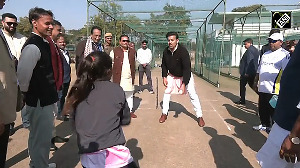Indian investigation agencies told rediff.com that their main line of questioning would concern the recce Headley had conducted for the 26/11 Mumbai attacks and also regarding the involvement of the Pakistani establishment in terrorism against India -- a charge which Pakistan has consistently denied.
The latest Pakistani army official in the list is Colonel Shah, a high ranking officer. Shah is believed to have stayed in touch with Headley while he conducted a recce at Mumbai and gave Headley support and information to carry out his task.
Headley is not the first LeT operative, who has linked the Pakistan army to terrorism in India. In the past, Sabahuddin, Ahmed Khwaja and several others too have spoken at length about this link. The Intelligence Bureau has several dossiers which detail the extent of the Pakistan army's involvement in supporting these terrorist groups.
Sabahuddin had clearly mentioned in his confession that he was received by officials of the Pakistan army at the border and they had arranged everything for him. Even when he had to leave Pakistan, the visa and the ticket were arranged by army officials. Ahmed Khwaja too spoke of the involvement of army officials.
Khwaja's interrogation report clearly mentions that it is the army officials who guard militants and take care of their every need. The famous Bilal mosque in Karachi is protected by the army, since it is where the militants offer prayers.
While the Pakistan army link has always been present in such cases, it was the Mumbai attacks which changed everything. Indian agencies say that the involvement of the Pakistani establishment was most visible in the 26/11 attacks. They were in the thick of the action right from intelligence gathering, logistic support and sophisticated training needed to carry out the attack.
The IB says that the Mumbai attacks were originally devised by the 313 Brigade of the Al Qaeda. At this point in time, the Inter-Services-Intelligence had planned on carrying out a small attack in the Kashmir valley, just to keep the ball rolling. However when the ISI got wind of what the 313 brigade was planning, they hijacked the plan and decided that they would involve themselves and the Lashkar in this plan.
This was the time when Headley was picked along with Tawwahur Rana to survey Mumbai. At the planning stage itself it was decided that there would be several army officials, who would stay in touch with these men. While six army officials stayed in touch with Headley, Sabahuddin and Rana, another set of Pakistani armymen were busy with the gunmen who finally carried out the attack on November 26.
The most crucial involvement of the Pakistan army was during the training stage. A manual to ensure that the gunmen faced no difficulty during the training was prepared by the Pakistan army.
For the men who conducted a recce, separate guidelines were issued and it seems as though the likes of Headley did not sidestep it one bit thus contributing the success of their mission.
Documentation for those conducting a recce:
- All documents such as identification cards and passports should be falsified and must be kept in safe custody at all times, so that they are not seized.
- Ensure that there are more than one identification card and passport and the foot solider should be well versed with the details of the different documents he carries
- All photographs on the documents should be without a beard.
- All falsified travel documents should be shown and approved by the establishment and a procedural control should be adopted. Moreover no family member's names should be added to any of the documents.
Manual for gunmen and trainers:
- The training will be conducted under the supervision of senior army officials and the army would be on guard at all times.
- After the training is complete, all traces should be wiped out.
- The training should be conducted in secluded areas.
- The establishment would always maintain a strong line of security at such training areas.
- The operatives should not discuss the involvement of the establishment during the training.
- The trainees should be picked in such a manner that one person does not know the other and only seven persons should be trained at a time.
- The identity of the trainer should never be revealed.
This manual which was prepared by the ISI and the Pakistan army has now been incorporated into both the Lashkar and Al Qaeda training manuals and continues to be used till date.
For the Mumbai attacks, Pakistan Special Services Group trained the gunmen. The SSG, which is the naval wing of the Pakistani army was roped in to train the terrorists as they were launching the operation from the sea.
Indian investigators say that these links have been mentioned several times in the various dossiers handed over to Pakistan, but they had not taken it seriously since they felt that the information was coming out of low level operatives and the statements were made by these operatives under duress.
Headley's statement could be India's best chance to nail Pakistan, since his statement will carry a lot of weight. The IB says that extreme care will be taken when they interrogate Headley. Apart from a police team from Mumbai and the National Investigating Agency they would be accompanied by an Indian magistrate who would record Headley's statement.
The presence of Federal Bureau of Investigation officials, during the questioning, would make the entire affair a foolproof one. The Indian investigators will look to probe Headley over his links to the Pakistani establishment.






 © 2025 Rediff.com -
© 2025 Rediff.com -